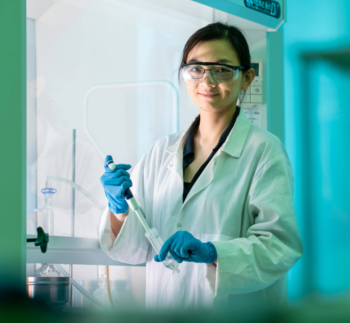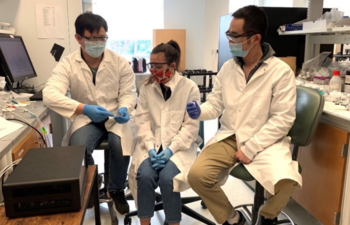In This Story
Pei Dong, an assistant professor in George Mason University’s Department of Mechanical Engineering, was recently awarded a National Science Foundation (NSF) CAREER award for $559,755 for her work on the multi-scale manufacturing of carbon nanostructures.

“While porous carbon structures have been manufactured for decades, it remains difficult to manufacture these structures with pre-specified porosity.” said Dong. “This grant aims to address this challenge and will have a huge impact in the areas of energy, water and carbon capture.”
Her proposed research will result in pioneered manufacturing processes that enable the creation of advanced-material devices, which perform more effectively and are critical for future energy and water demands. These structures could be utilized for water treatment, solar cells, supercapacitors, batteries, and carbon capture.
The CAREER award is reserved for the nation’s most talented up-and-coming researchers. From the NSF website: “The Faculty Early Career Development (CAREER) Program offers NSF’s most prestigious award in support of early-career faculty who have the potential to serve as academic role models in research and education and to lead advances in the mission of their department or organization.”

Leigh McCue, Mechanical Engineering department chair, said, “Pei has been a tremendous asset. As one of the first tenure-track faculty hired into our young department, she has been a pioneer and leader from day one. It is great to see her talents recognized with this prestigious award.”
Dong credits the Mason culture in helping her in her early-career success. “Mason is great. I highly appreciate all the support I get from my colleagues, the department, the college and the university. I enjoy being in the lab and classroom and working with students and also our outreach activities where we interact with the local K-12 community. Mason gives faculty a bigger platform, since we’re such a huge university.”
She’s also encouraged at how excited her students are to be part of this research. “The students' enthusiasm is truly remarkable as they recognize the profound impact of our research efforts and are wholeheartedly engaged in the pursuit of a sustainable society. They are eager to tackle these challenges head-on, determined to find solutions and make a meaningful difference.”
The grant will run for five years, wrapping up in 2029.
